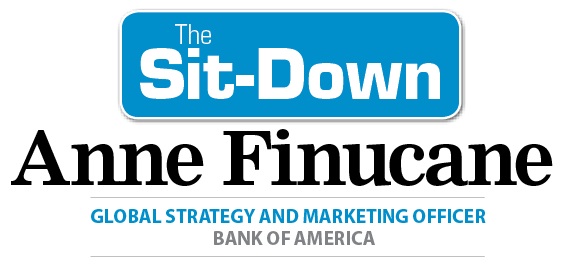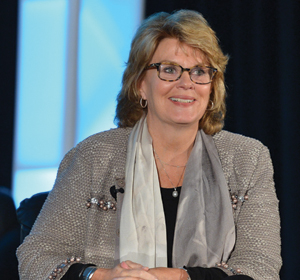
I was a hippie, so that gives you some sense of what trajectory I thought I was on after college.
I thought that I would begin working, work for a few years, go to graduate school and I anticipated either running an art gallery or teaching English.
I started in city politics. In city politics, I worked for the office of cultural affairs. I had been an American literature major and an art minor so I cared greatly about those kinds of subjects.
Eventually I cut off my hair, I took off the Mexican wedding dress I had been wearing and started to dress more appropriately, and lo and behold, I was asked to more meetings and I was able to demonstrate some competence.
 |
Photo by: MARC BRYAN-BROWN
|
I was offered a job in local television in public relations as a creative services director. From there, I was offered a job in advertising as their executive producer, and over time I moved to the business side and eventually became the head of account management for Hill Holliday. After that, I went into consultancy and from there I went into banking as the chief marketing officer.
In a way, each of those things made sense — politics, public relations, advertising, consultancy — but I’m not sure I knew what each of them would amount to. And along the way I had a lot of kids.
[In the workplace] all of us are looking for the land mines. We don’t always see them, but you get better at it over time. Sometimes you see other people hit them and you know not to go there.
I do think work is seen as an action verb, and I think it is an action verb, but it’s important you observe the landscape. … I never tread carefully, but I do try to have a sense of time and place, and I think that matters.
Thinking is underrated. … The opportunity to sit with yourself, to read, to think, to observe, to aggregate all the inputs you are getting and then to make some sense of it, because of the 24/7 conveyor belt we’re all on, you don’t get many opportunities to step off that.
Opportunities are your time in the car, on the train, or that moment in the morning, and you have to take that and use it.
Mentorships are getting to be like a pop culture thing, like you put it in everyone’s performance review. … I feel like it’s a little like talking to a congregation.
You’re going to mentor everybody? It can’t be done. Having coffee with every young person that comes in, you probably can’t give them the time they need.
My observation as a young woman, mostly in a male-dominated world, was mentorship meant there were just guys that seemed to have something in common with a younger fellow and they either played golf or they had a drink or something.
To take a lesson from that, it’s just finding some commonality, because that’s an easy place to begin a conversation.
Asking for help from the men and women in the accounting department might not seem like the natural way to go, but it was enormously helpful because to be able to make a case for an ROI, to make a difference in terms of the financial community, meant that I could get more money to spend on the programs I thought would work and we could demonstrate an ROI.
I don’t have one thing I look for in hiring. I do have a belief in energy givers versus energy takers, and that could happen in a minute. Sometimes when people come in a room you think, “Why am I suddenly exhausted?”
Other people, you think, “It’s an hour into this conversation and I’d like to have more of a conversation.”
Clear thinking, even if it’s not a reflection of your own thinking, is probably one of the greatest gifts because it gets you thinking about something differently than you would have otherwise.
Pushing a product or a sponsorship onto us is probably not a winning formula. Learn our company, learn how we evaluate a sponsorship’s potential value, and probably where we are in our trajectory.
If you had come to us three years ago at the low point of the financial crisis, that was not a moment we were going to take on something new. But I can’t tell you how many people came to us and said, “Well, you know, you’re really in tough shape so we could do you some good.”
Everybody knows what the pros and cons are of signing individual athletes. For us, we’ve certainly done it. But we’re more comfortable associating with leagues and teams and cities and community outreach and not hanging our hat on one individual.
We are trying to serve 50 million customers throughout the United States, and relying on one individual to carry the water on that is probably too much.
Some marketing to women is sophomoric, but it’s more in the TV commercials.
I had many days, weeks, months and probably a few years that I didn’t move forward at all. I probably moved back. I may have had a sick child or my husband was at a different point in his career.
Hopefully, we’re in it for the long haul, so if success is going to be measured every day that you come into work and you have to get it to where you want it to go that day, it’s going to be very frustrating.
I knew what I wanted. I knew I wanted a family, I was willing to invest in it, and I had more kids than I thought I would have, but I’m happy. So every day wasn’t a good day. I think that’s life. I don’t think every day is a good day even if you’re at the top of your game.
You’re not always charging forward. You’re doing the best you can every day, you’re being as smart as you can.
My advice to young people is you have to be undaunted. Just like anything in life, you have to get up, dust yourself off, and move on.







